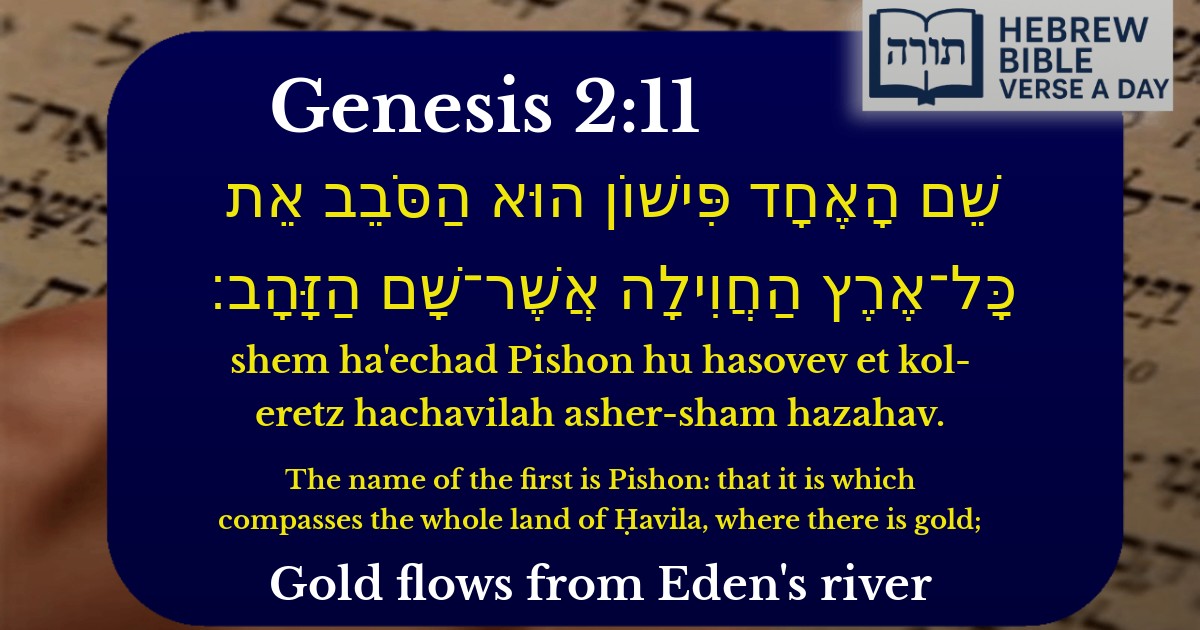Join Our Newsletter To Be Informed When New Videos Are Posted
Join the thousands of fellow Studends who rely on our videos to learn how to read the bible in Hebrew for free!
Hebrew Text
שֵׁם הָאֶחָד פִּישׁוֹן הוּא הַסֹּבֵב אֵת כָּל־אֶרֶץ הַחֲוִילָה אֲשֶׁר־שָׁם הַזָּהָב׃
English Translation
The name of the first is Pishon: that it is which compasses the whole land of Ḥavila, where there is gold;
Transliteration
Shem ha'echad Pishon hu hasovev et kol-eretz hachavilah asher-sham hazahav.
Hebrew Leining Text
שֵׁ֥ם הָֽאֶחָ֖ד פִּישׁ֑וֹן ה֣וּא הַסֹּבֵ֗ב אֵ֚ת כׇּל־אֶ֣רֶץ הַֽחֲוִילָ֔ה אֲשֶׁר־שָׁ֖ם הַזָּהָֽב׃
שֵׁ֥ם הָֽאֶחָ֖ד פִּישׁ֑וֹן ה֣וּא הַסֹּבֵ֗ב אֵ֚ת כׇּל־אֶ֣רֶץ הַֽחֲוִילָ֔ה אֲשֶׁר־שָׁ֖ם הַזָּהָֽב׃
🎵 Listen to leining
Parasha Commentary
📚 Talmud Citations
This verse is quoted in the Talmud.
📖 Yoma 10b
The verse is referenced in a discussion about the rivers of Eden and their significance.
📖 Bava Batra 74a
The verse is mentioned in a discussion about the geography of the world and the rivers that flow from Eden.


The River Pishon and Its Significance
The verse describes the first of the four rivers emerging from Gan Eden (Genesis 2:11), named Pishon, which encircles the land of Ḥavila, known for its gold. This passage is rich with symbolic and geographical interpretations in traditional Jewish sources.
Rashi's Commentary on Pishon and Ḥavila
Rashi (Rabbi Shlomo Yitzchaki) explains that the name Pishon is related to the Hebrew root פוש, meaning "to increase" or "to spread." This suggests the river's abundant flow and its role in enriching the land it surrounds. Regarding Ḥavila, Rashi identifies it as a land in India, based on Talmudic and Midrashic sources (Yoma 34b, Bereishit Rabbah 16:4). The gold found there is described as exceptionally pure, symbolizing material and spiritual wealth.
Midrashic Interpretations
The Midrash (Bereishit Rabbah 16:2) elaborates on the spiritual significance of the rivers of Gan Eden. The Pishon is associated with Torah wisdom, as its name hints at expansion (pishon – spreading knowledge). The gold of Ḥavila is metaphorically linked to the words of Torah, which are "more precious than gold" (Psalms 19:11). This aligns with the Kabbalistic view that the rivers represent divine channels of blessing and wisdom.
Rambam's Geographic Perspective
Rambam (Maimonides), in his rationalist approach, interprets the rivers of Gan Eden as real geographical features. He suggests that Pishon may correspond to the Nile or another major river known in antiquity for sustaining fertile lands (Guide for the Perplexed 2:30). The mention of gold in Ḥavila reflects the region's historical reputation for mineral wealth, as noted in other ancient Near Eastern texts.
Symbolism of Gold in Jewish Thought
Conclusion: The Pishon as a Source of Blessing
In Jewish tradition, the Pishon is more than a physical river—it embodies the flow of divine blessing and wisdom into the world. Its connection to Ḥavila's gold reminds us that material wealth, when sanctified, can elevate spiritual pursuits. This aligns with the broader Torah principle that the physical world is a vessel for holiness when used in service of Hashem.